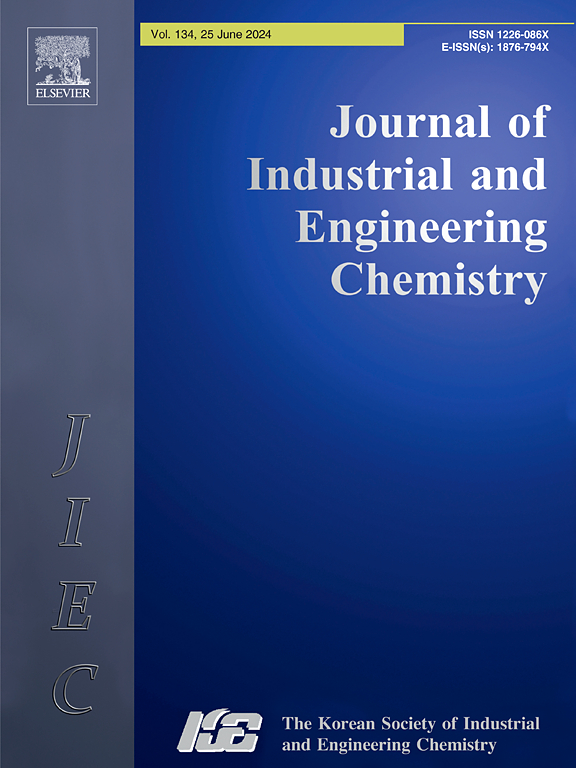A review of binder-free electrodes for advanced supercapacitors
IF 5.9
3区 工程技术
Q1 CHEMISTRY, MULTIDISCIPLINARY
Journal of Industrial and Engineering Chemistry
Pub Date : 2025-01-25
DOI:10.1016/j.jiec.2024.06.025
引用次数: 0
Abstract
Supercapacitors are high-performance electrochemical energy storage devices with high power density, long cycle life, and rapid charge and discharge capabilities. However, in the conventional electrode fabrication process, the addition of binders without conductivity and electrochemical activity reduces the mass of active materials and increases resistance in the electrode, which compromises its electrochemical performance. Therefore, the binder-free electrode is an effective method to enhance the electrochemical performance and energy density of electrodes. The different fabrication technologies for binder-free electrodes have been explored in detail, especially focusing on surface growth on current collectors, self-assembly techniques, and the new technological methods. The design of electrochemically active materials, including carbon, metal compounds, and conductive polymers have been emphasized, along with the optimization of processes and the enhancement of performance, interface engineering and improvements in electrode functionality, the utilization of multifunctional performance materials, and the design and optimization strategies grounded in theoretical simulations. Depending on the actual situation, binder-free electrodes can increase energy density and specific capacitance 10% to 30% approximately. Finally, the advantages of binder-free electrode technology in supercapacitors and other energy storage fields are introduced, further exploring future research directions and the potential breakthroughs and challenges that binder-free electrode technology may bring.


先进超级电容器无粘结剂电极综述
超级电容器是一种高性能电化学储能装置,具有功率密度高、循环寿命长、充放电速度快等特点。然而,在传统的电极制造工艺中,添加无导电性和电化学活性的粘结剂会减少活性材料的质量,增加电极的电阻,从而影响其电化学性能。因此,无粘结剂电极是提高电极电化学性能和能量密度的有效方法。人们对无粘结剂电极的不同制造技术进行了详细的探讨,特别是对集流器表面生长、自组装技术和新技术方法进行了重点研究。此外,还强调了电化学活性材料(包括碳、金属化合物和导电聚合物)的设计、工艺优化和性能提升、界面工程和电极功能改进、多功能性能材料的利用,以及基于理论模拟的设计和优化策略。根据实际情况,无粘结剂电极可将能量密度和比电容提高约 10%至 30%。最后,介绍了无粘结剂电极技术在超级电容器和其他储能领域的优势,进一步探讨了无粘结剂电极技术未来的研究方向以及可能带来的突破和挑战。
本文章由计算机程序翻译,如有差异,请以英文原文为准。
求助全文
约1分钟内获得全文
求助全文
来源期刊
CiteScore
10.40
自引率
6.60%
发文量
639
审稿时长
29 days
期刊介绍:
Journal of Industrial and Engineering Chemistry is published monthly in English by the Korean Society of Industrial and Engineering Chemistry. JIEC brings together multidisciplinary interests in one journal and is to disseminate information on all aspects of research and development in industrial and engineering chemistry. Contributions in the form of research articles, short communications, notes and reviews are considered for publication. The editors welcome original contributions that have not been and are not to be published elsewhere. Instruction to authors and a manuscript submissions form are printed at the end of each issue. Bulk reprints of individual articles can be ordered. This publication is partially supported by Korea Research Foundation and the Korean Federation of Science and Technology Societies.

 求助内容:
求助内容: 应助结果提醒方式:
应助结果提醒方式:


